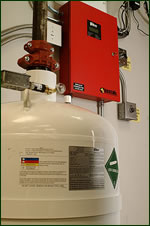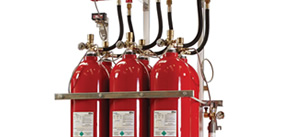FM-200 suppression systems provide a safe, effective and clean alternative to Halon systems10 seconds or less. When it comes to a fire suppressant, using an agent that can be delivered as quickly as possible will lead to less damage of the very property that it is used to protect. FM-200 systems reach  extinguishing levels this quickly and are used to stop ordinary combustible, electrical, and flammable liquid fires (Class A, B and C fires) before any significant damage can occur.
extinguishing levels this quickly and are used to stop ordinary combustible, electrical, and flammable liquid fires (Class A, B and C fires) before any significant damage can occur.
Benefits of FM-200
There are several reasons that FM-200 can be used above other fire suppressants. These include:
- Fast – combined with programmable panels and fast acting smoke detectors which can sense fire in its early stages and release agent.
- Effective – Interrupts the chemical chain reaction, absorbs heat and suppresses the fire.
- Safe – U.S. EPA has approved for use in occupied spaces .
- Clean – an odorless, colorless gas that leaves no residue behind to clean. It is also electrically nonconductive and will not thermally shock delicate circuitry as with some other agents.
- Earth Friendly – not ozone depleting.
Why FM-200
When you have a choice between fire suppressant agents, understanding the applications that each of the agents are designed for is important. The professionals at Reliable Fire & Security are able to help you choose the system that is the best fit for your organization.
When FM-200
We recommend using an FM-200 Suppression System when one or more of the following situations exists:
- The value of the area’s contents and/or its importance to business continuity demands that the system be deployed in seconds.
- Water sprinkler systems may damage the area’s contents.
- Employees occupy the protected area.
- Clean up must be eliminated.
- Ease of design and installation is needed.
It may seem like an FM-200 system would have endless applications and uses. Some of the more typical applications include:
- Computer Rooms
- Laboratories
- Healthcare Facilities
- Museums or Art Galleries
- Libraries
- Process Control Rooms
- Record Storage Facilities
- Historical Buildings

